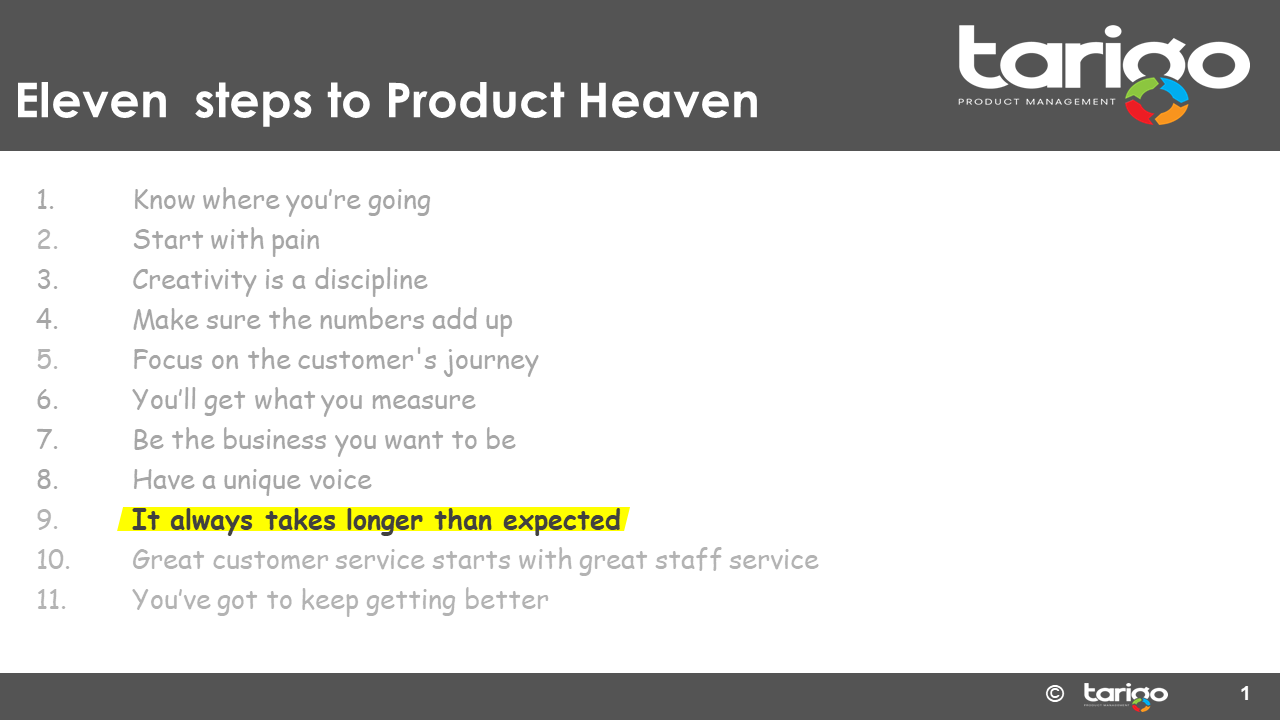Your daily dose of Product Management Goodness
Want to know more?
We would love to hear your questions and suggestions for topics you would like to see covered in our future blog posts, so don't be shy and get in touch!


Product Heaven
What’s the most likely route to Product Heaven? Over the years I’ve consulted and trained product teams across the globe. There have been many lessons along the way. This is my distillation of the steps that are most likely going to lead to product success:
9. It always takes longer than expected
Anyone who’s spent any time around product teams will know this is true. It’s even got a name: Hofstadter's law, named after Douglas Hofstadter to describe the widely experienced difficulty of accurately estimating the time it will take to complete tasks of substantial complexity
So what should we do about it? Two things;
1. Accept it
Those new to the discipline might feel a need to push against this, That they will break the mould and not accept it. If that’s you I wish you every success and please feel free to report back when you solve this issue. But still follow point 2!
2. Plan for it.
The problem with things taking longer is around expectation. Specifically customer expectation, All too often Product Teams overcommit (“My product will include this feature set and be ready on September 4th 2024”) and then disappoint when neither the feature set of the date is hit. Of course, have some contingency, but keep dates and detail more abstract the further away from delivery you are. Add depth and detail as you get closer to delivery (an added bonus of this is that it gives your sales colleagues a reason to keep dialogue going with customers)
It might always take longer than YOU expected, but you don’t need your customers to share that pain
Want some support? We help teams plan and structure their product communication
read more

Product Heaven
What’s the most likely route to Product Heaven? Over the years I’ve consulted and trained product teams across the globe. There have been many lessons along the way. This is my distillation of the steps that are most likely going to lead to product success:
8. Have a unique voice
As sure as night follows day, you’ll have competitors in your market trying to win the same customers. You’ve got to stand out to gain customer attention. And stand out in a good way! Bombarding customers with ‘look at me’ emails is the equivalent of turning up to a funeral in a Hawaiian shirt. Sure, you’ll get noticed, and then ignored. The key is to develop a consistent and unique voice that plays well in your target market and offers them something different, Think about Innocent Smoothies. Yep, they make smoothies like tons of other companies., but their playful, tongue-in-cheek, energetic, and ethical voice is ever present. From the cute woolly hats to the cartoon marketing campaigns to the ‘Bolt form the Blue’ product naming, everything that comes out of Fruit Towers HQ (see what they did there!) has helped them build a £350m business in a crowded market.
Want some support? We help teams define their position in market
read more

Product Heaven
What’s the most likely route to Product Heaven? Over the years I’ve consulted and trained product teams across the globe. There have been many lessons along the way. This is my distillation of the steps that are most likely going to lead to product success:
5. Be the business you want to be
You’ve got to get as close to delivering your visionary product or service as quickly as you can. Otherwise, you’ll have no idea if your business model actually works from a customer perspective. This is not about being a fake (i.e. fake it until you make it) but more about being a Swan (look calm and controlled on the surface but be paddling furiously out of public gaze). Ask Jeeves is a good example of this. The search engine promoted a vision of using natural language searches to find what you were looking for online. And how did they test this model? They had over 100 editors monitoring what people searched for, then hand-selecting sites that seemed to best answer those queries. Expensive? Yep. Time consuming? Sure, Unprofitable? No doubt. But it allowed them to first prove out the market need for their vision and then focus on delivering that business model efficiently.
Want some support? We help teams build and execute their product vision.
read more

Product Heaven
What’s the most likely route to Product Heaven? Over the years I’ve consulted and trained product teams across the globe. There have been many lessons along the way. This is my distillation of the steps that are most likely going to lead to product success:
6.You’ll get what you measure
People adjust their behavior based on the metrics they’re measured against. Anything you measure will drive your team to optimize their score on that metric. This very powerful phenomenon can make a product., but can deliver unintended consequences if not thought through properly (The British government, concerned about the number of venomous cobras in Delhi, offered a bounty for every dead cobra. Initially, this was a successful strategy; large numbers of snakes were killed for the reward. Eventually, however, enterprising people began to breed cobras for the income. When the government became aware of this, the reward program was scrapped. When cobra breeders set their now-worthless snakes free, the wild cobra population further increased) . So when you’re taking a product to market think very carefully about how you measure success. It needs to balance short term and long term goals by consisting of lead and lag measures (measuring sales revenue isn’t going to mean much if we didn’t get the product out in the right timeframe). It also needs to be balanced across the full customer journey (measuring win/loss ratios will be for nothing if poor customer support drives a huge churn rate). In simple terms what you measure is what you’ll get.
Want some support? Read Measure what matters by John Doerr. We help teams build out KPI OKR and metric suites.
read more
Check out the Archive